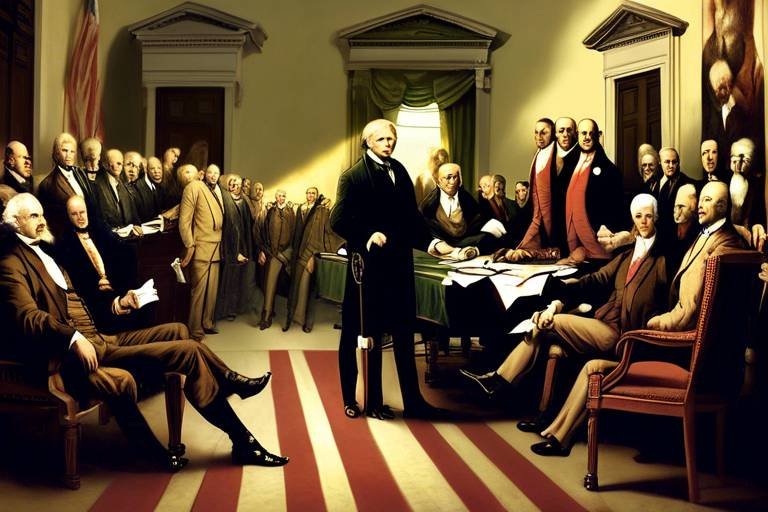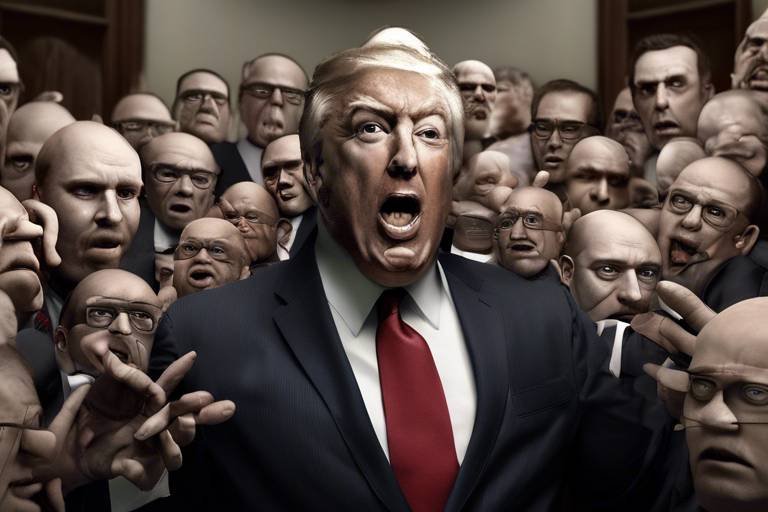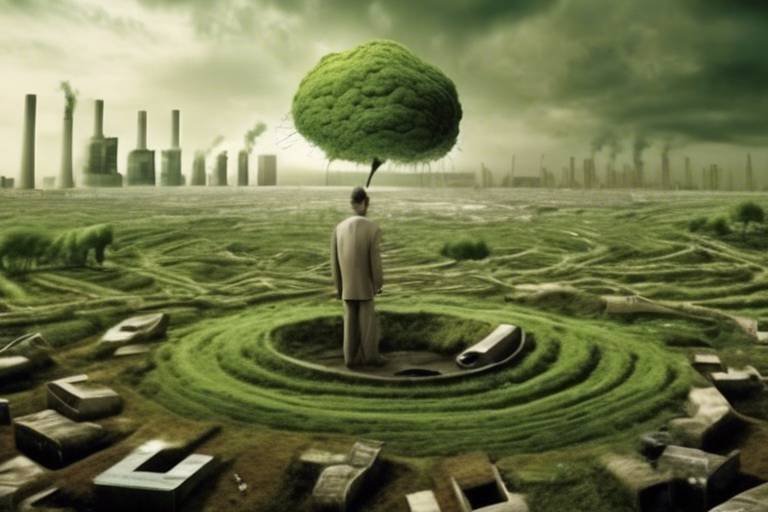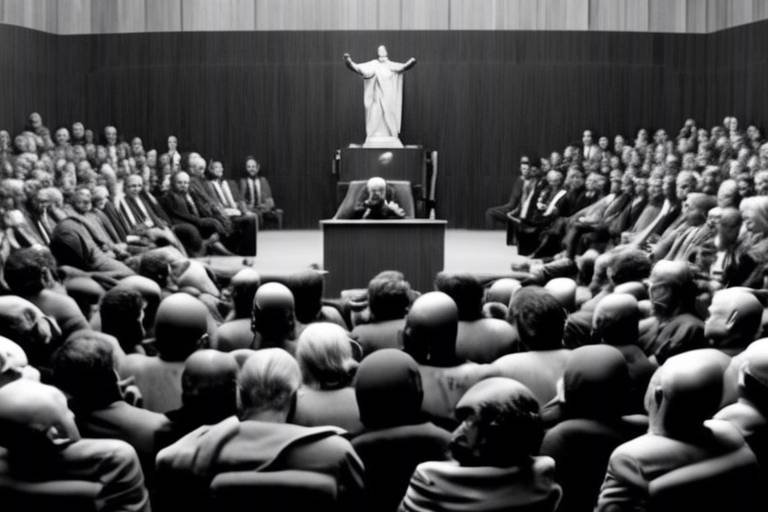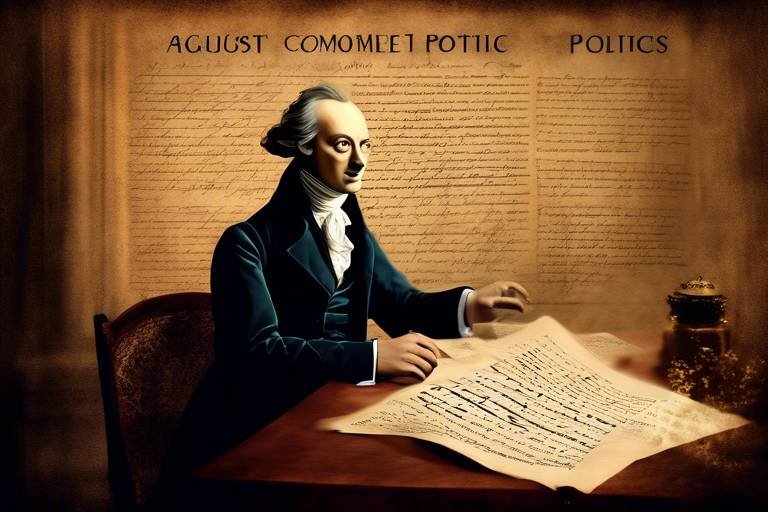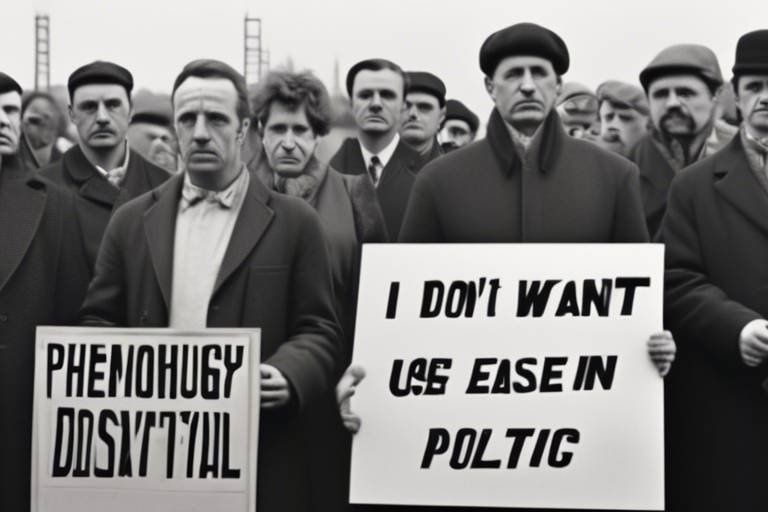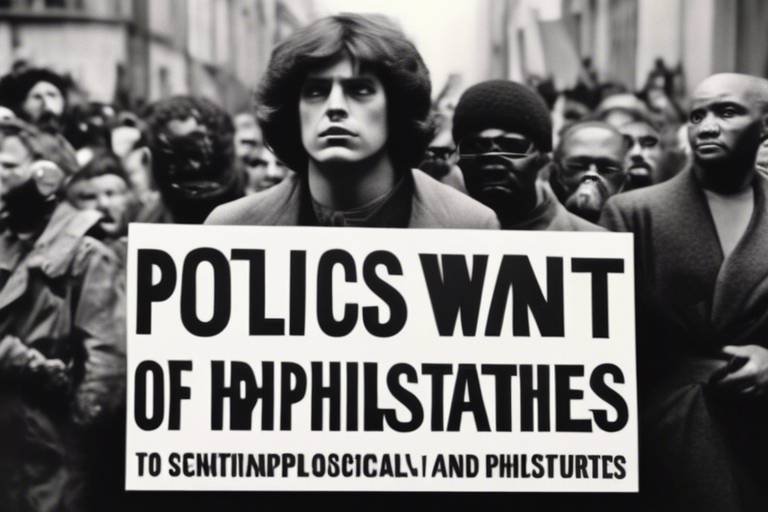The Perils and Positives of Political Idealism
Political idealism is a fascinating yet complex concept that has stirred debates among scholars, politicians, and citizens alike. At its core, political idealism advocates for the pursuit of lofty goals and principles in governance and policy-making. It encourages a vision of a better society, one that is rooted in values such as justice, equality, and freedom. However, while the aspirations of political idealism can be inspiring, they also come with significant challenges and criticisms. This article delves into the dual nature of political idealism, exploring both its potential benefits and drawbacks in shaping political landscapes and influencing governance, policy-making, and societal values.
On one hand, political idealism can serve as a powerful motivator for change, pushing societies to strive for a more equitable and just world. Think of it as a guiding star—an ideal that illuminates the path toward progress. The principles of political idealism can lead to ambitious reforms that aim to address deep-rooted issues, such as poverty, discrimination, and environmental degradation. For instance, movements advocating for universal healthcare or climate action often stem from idealistic beliefs about the inherent worth of every individual and the collective responsibility to protect our planet.
Yet, on the flip side, the pursuit of such ideals can sometimes lead to disillusionment. When the gap between ideals and reality becomes too wide, supporters may feel frustrated and abandon their causes. This raises an essential question: Can we truly achieve the ideals we strive for, or are they merely unattainable dreams? The tension between aspiration and reality is a recurring theme in political idealism, and understanding this duality is crucial for anyone engaged in political discourse or activism.
In the following sections, we will explore the historical context of political idealism, the influential figures who have shaped its development, and the impact it has on policy-making. We will also address the critiques that often accompany idealistic approaches and the consequences that arise when idealistic policies are put into practice. By examining both the perils and positives of political idealism, we aim to provide a comprehensive overview that not only informs but also inspires critical thinking about the role of ideals in our political systems.
Understanding political idealism is essential for grasping its impact on political theory and practice. Political idealism is fundamentally about the belief that political actions should be guided by ethical principles and moral values rather than merely pragmatic considerations. This approach often emphasizes the importance of vision, ethics, and the greater good in shaping policies and governance.
Political idealism has evolved through various historical movements, adapting to the changing political landscape. From the ancient philosophies of Plato to the modern-day theories of social justice, idealism has been a driving force behind many significant political changes. This section highlights key moments and figures that have shaped its development and relevance in contemporary politics.
Throughout history, many notable political idealists have contributed to the evolution of political thought. Their philosophies and contributions illustrate the diverse perspectives within idealism. For example, thinkers like John Locke and Thomas Jefferson championed the rights of individuals, emphasizing liberty and equality as foundational principles of governance. In contrast, more contemporary idealists focus on issues such as environmental sustainability and social justice, advocating for policies that reflect a commitment to these ideals.
Plato's vision of the ideal state serves as a cornerstone of political idealism. He believed that a just society could only be achieved through the rule of philosopher-kings—wise and virtuous leaders who would prioritize the common good over personal interests. This concept has had a lasting influence on political theory, prompting discussions about the nature of leadership and governance.
In today’s world, modern political idealists continue to address contemporary issues through an idealistic lens. They advocate for policies that not only aim for immediate benefits but also consider long-term implications for society and the environment. This focus on sustainability and ethics reflects a growing recognition of the interconnectedness of global challenges.
Political idealism significantly influences policy-making processes. Idealistic principles shape legislation and governance, often leading to ambitious reforms. For instance, the push for comprehensive civil rights legislation in the 1960s was driven by a vision of equality and justice for all, showcasing how idealism can mobilize collective action for significant change.
Despite its merits, political idealism faces criticism. Detractors argue that it can be impractical, leading to policies that are difficult to implement or sustain. They contend that an overemphasis on ideals can blind policymakers to the complexities of real-world politics, resulting in disillusionment among supporters. Critics often point out that while ideals are noble, they must be balanced with pragmatic considerations to be effective.
This subsection contrasts political idealism with realism, highlighting the tensions between these two approaches. While idealism focuses on what ought to be, realism is grounded in what is. This dichotomy can create challenges in political strategy, as idealists may struggle to navigate the often murky waters of political compromise and negotiation.
Exploring the consequences of idealistic policies reveals both successful outcomes and failures. While some idealistic initiatives have led to transformative change, others have fallen short, illustrating the challenges faced by idealists in practice. Understanding these dynamics is crucial for developing a nuanced perspective on the role of political idealism in shaping our world.
- What is political idealism? Political idealism is the belief that political actions should be guided by ethical principles and moral values rather than mere pragmatism.
- Who are some key figures in political idealism? Notable political idealists include Plato, John Locke, Thomas Jefferson, and contemporary advocates for social justice and environmental sustainability.
- What are the main critiques of political idealism? Critics argue that political idealism can be impractical and may lead to disillusionment among supporters if ideals are not aligned with reality.

The Definition of Political Idealism
Understanding political idealism is essential for grasping its impact on political theory and practice. At its core, political idealism is the belief that political structures and policies should be guided by ethical principles and moral values rather than mere pragmatism or power dynamics. This perspective emphasizes the importance of creating a society that reflects our highest aspirations, focusing on what could be rather than what is. Imagine a world where leaders prioritize the common good, fostering environments where justice, equality, and human rights thrive. It's a vision that inspires many and serves as a beacon for political discourse.
The roots of political idealism can be traced back to philosophical traditions that seek to understand the nature of justice, governance, and the role of individuals within society. Think of it as a compass guiding political action towards a more equitable and humane society. Idealists often argue that policies should not only address immediate issues but also strive for a future where the collective well-being is prioritized. This approach is often contrasted with more pragmatic or realistic views that focus on the constraints of human nature and the complexities of political power.
Historically, political idealism has been associated with various movements advocating for social change, such as the civil rights movement and environmentalism. These movements embody the belief that idealistic principles can lead to tangible improvements in society. For example, consider the civil rights movement in the United States, where activists envisioned a nation free from racial discrimination. Their idealism fueled a powerful movement that led to significant legislative changes. This illustrates how political idealism can serve as a catalyst for reform, pushing society toward its better self.
However, political idealism is not without its challenges. Critics often argue that it can lead to unrealistic expectations and disillusionment when lofty ideals clash with the harsh realities of political life. Yet, the enduring appeal of idealism lies in its ability to inspire individuals and communities to strive for a better world. It's this tension between aspiration and reality that makes political idealism a fascinating and crucial aspect of political discourse.
In summary, political idealism is a dynamic and influential concept that shapes our understanding of governance and societal values. By aspiring to higher principles, idealists challenge us to rethink our political practices and strive for a society that reflects our deepest values. As we delve deeper into its historical context and implications, we will uncover the rich tapestry of ideas that have emerged from this compelling perspective.

Historical Context of Political Idealism
Political idealism is not just a modern phenomenon; it has deep roots that stretch back through the annals of history. To truly appreciate its impact on today's political landscape, we must first understand the key historical movements and figures that have shaped this ideology. From the ancient philosophers to contemporary thinkers, political idealism has evolved and adapted, reflecting the changing values and aspirations of societies.
One of the earliest examples of political idealism can be traced back to ancient Greece, where philosophers like Plato envisioned a society governed by justice and the pursuit of the common good. Plato's ideas about the "ideal state" set the stage for future discussions about governance and morality in politics. His belief in philosopher-kings as the ideal rulers illustrates the core tenet of political idealism: the notion that governance should be guided by ethical principles and a vision for a better society.
As we move through history, we encounter the Enlightenment period, a time when reason and individual rights began to take precedence over tradition. Thinkers like John Locke and Jean-Jacques Rousseau championed the idea that societies could be constructed based on rational principles and the inherent dignity of individuals. Their philosophies laid the groundwork for modern democratic ideals, emphasizing the importance of liberty, equality, and fraternity.
Fast forward to the 19th and 20th centuries, and we see political idealism manifesting in various social movements. The American Civil Rights Movement and the Women’s Suffrage Movement are prime examples where idealistic visions of equality and justice drove significant societal change. These movements were fueled by the belief that a more just society was not only possible but necessary. The ideals of freedom and equality became rallying cries, uniting diverse groups of people in the pursuit of a common goal.
To better understand the evolution of political idealism, let's take a look at some key figures and their contributions:
| Figure | Contribution | Era |
|---|---|---|
| Plato | Concept of the ideal state governed by philosopher-kings | Ancient Greece |
| John Locke | Advocated for natural rights and government by consent | 17th Century |
| Jean-Jacques Rousseau | Promoted the idea of the social contract and general will | 18th Century |
| Martin Luther King Jr. | Championed civil rights through nonviolent protest | 20th Century |
In summary, the historical context of political idealism reveals a rich tapestry of thought and action that has shaped our understanding of governance and societal values. Each era brought forth new ideas and challenges, pushing the boundaries of what is possible in political thought. As we explore the implications of political idealism today, it’s essential to recognize how these historical influences continue to resonate in our contemporary struggles for justice and equality.
- What is political idealism? Political idealism is a philosophy that emphasizes the importance of ethical principles and ideals in shaping governance and societal values.
- Who are some key figures in political idealism? Notable figures include Plato, John Locke, Jean-Jacques Rousseau, and Martin Luther King Jr., each contributing unique perspectives to the ideology.
- How has political idealism influenced modern politics? Political idealism has inspired movements for social justice, equality, and democratic governance, shaping contemporary political discourse.
- What are the criticisms of political idealism? Critics argue that political idealism can be impractical and may lead to disillusionment when ideals clash with reality.
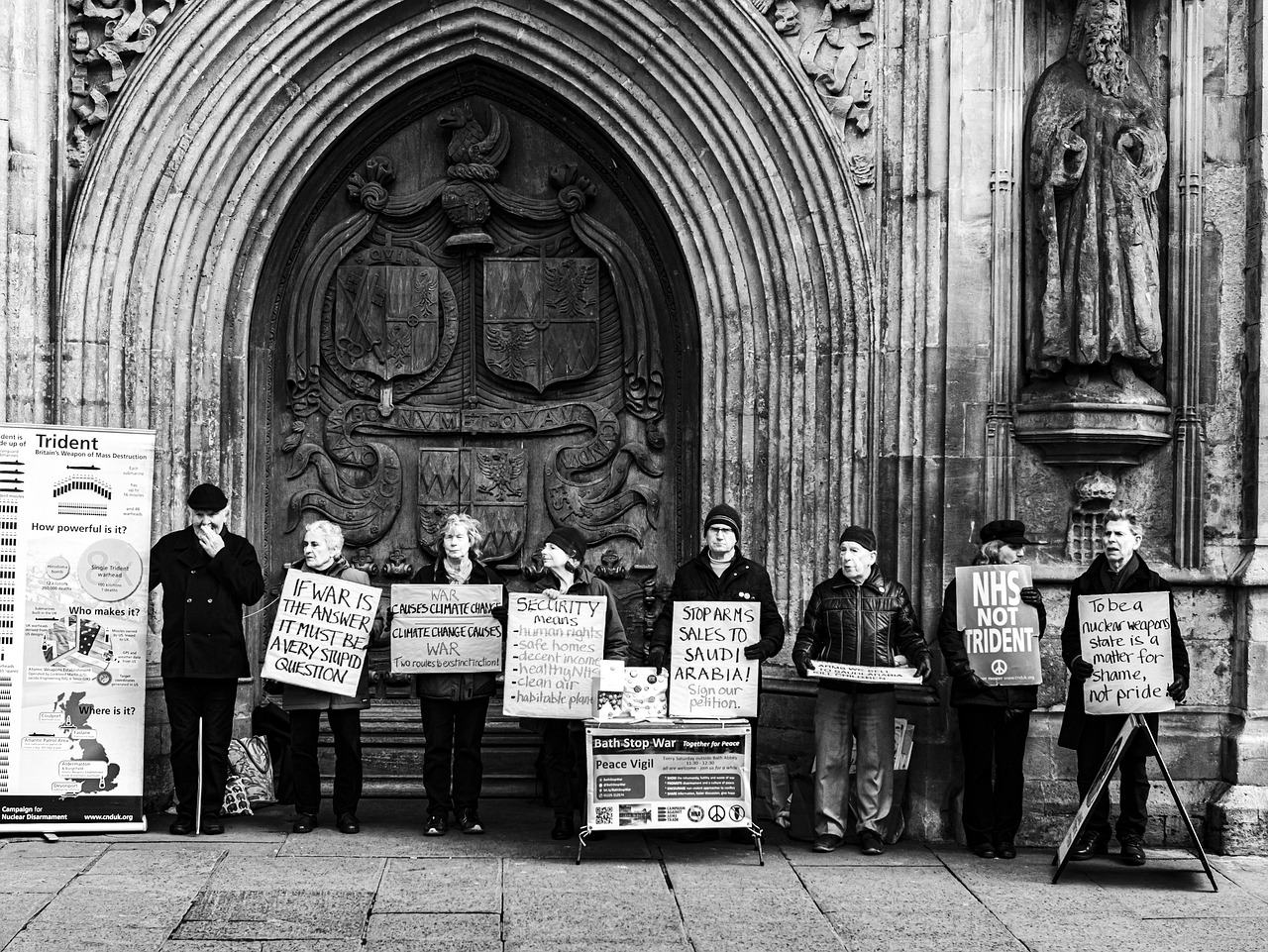
Influential Political Idealists
Throughout history, various thinkers have championed the cause of political idealism, each contributing unique perspectives that have shaped the political landscape. These influential political idealists have not only inspired movements but have also laid the groundwork for how we envision governance and societal values today. Their ideas often serve as a beacon of hope, urging society to strive for a more just and equitable world. Among these figures, we find a diverse array of philosophies and approaches that reflect the complexity of human thought.
One of the most prominent political idealists is Immanuel Kant, whose works emphasized the importance of morality in politics. Kant argued that political actions should be guided by ethical principles, which he believed were universal and applicable to all rational beings. His concept of the "categorical imperative" encourages individuals to act in ways that could be universally accepted as moral law. This notion has profoundly influenced modern democratic thought, advocating for justice and human rights as foundational elements of political systems.
Another key figure is John Stuart Mill, who championed individual liberty and utilitarianism. Mill's belief that the best political system is one that maximizes happiness for the greatest number of people aligns closely with idealistic principles. His advocacy for free speech and personal freedoms has had a lasting impact on liberal democracies, emphasizing the role of individual rights in shaping government policies. Mill's work serves as a reminder that idealism is not merely theoretical; it has practical implications for governance and societal well-being.
Moving beyond the Enlightenment, Martin Luther King Jr. stands out as a modern idealist whose vision of a racially integrated and harmonious society inspired a generation. His commitment to nonviolence and civil disobedience in the face of systemic injustice exemplifies the idealistic belief in the power of moral persuasion. King’s famous "I Have a Dream" speech encapsulates the essence of political idealism: the yearning for a better future where equality and justice prevail. His legacy continues to motivate activists and leaders who strive for social change today.
Furthermore, we cannot overlook the contributions of Nelson Mandela, who embodied the ideals of resilience and reconciliation. Mandela's fight against apartheid in South Africa was rooted in a profound belief in equality and human dignity. His idealistic approach to politics emphasized forgiveness and unity, demonstrating that even the most entrenched conflicts can be resolved through understanding and compassion. Mandela’s leadership serves as a powerful example of how idealism can drive social transformation and inspire hope in the face of adversity.
In examining these influential political idealists, it becomes clear that their ideas are not only relevant in their own times but continue to resonate today. They challenge us to envision a world that transcends the limitations of our current political systems, urging us to strive for ideals that promote justice, equality, and human rights. While the path of political idealism is fraught with challenges, these thinkers remind us that the pursuit of a better society is a noble endeavor worth undertaking.
- What is political idealism? Political idealism is a philosophy that emphasizes the importance of ideals and ethical principles in shaping political systems and governance.
- Who are some notable political idealists? Influential political idealists include Immanuel Kant, John Stuart Mill, Martin Luther King Jr., and Nelson Mandela, each contributing significantly to the discourse on justice and equality.
- How does political idealism impact policy-making? Political idealism influences policy-making by inspiring ambitious reforms that aim to align laws and governance with ethical principles and societal values.
- What are the criticisms of political idealism? Critics argue that political idealism can be impractical, leading to disillusionment when lofty goals are not achieved in the real world.

Plato and the Ideal State
When we think of political idealism, one name often rises to the top like cream: Plato. His vision of the ideal state isn’t just a dusty relic of the past; it’s a framework that continues to stir debates among political theorists today. Plato, a philosopher from ancient Greece, proposed a society governed by the wisest—those he called the "philosopher-kings." Imagine a world where the rulers are not just politicians but enlightened thinkers, making decisions based on wisdom and justice rather than power and greed. Sounds like a dream, right?
In his seminal work, The Republic, Plato outlines his vision of a just society, built on the principles of harmony and order. He believed that an ideal state would consist of three distinct classes: the rulers, the auxiliaries (warriors), and the producers (farmers, artisans, etc.). Each class has its own role, much like how a well-functioning orchestra requires different instruments to create a beautiful symphony. The rulers, equipped with knowledge and virtue, would make decisions that benefit the entire society, while the auxiliaries would protect it, and the producers would ensure its economic stability.
Plato’s ideal state is not just about governance; it’s also about education. He argued that individuals must be educated to understand the forms of justice, beauty, and equality. This education isn’t just about memorizing facts; it’s about cultivating the mind and soul. In Plato's view, the ideal state would prioritize the education of its citizens, ensuring that they are well-prepared to contribute to society. The concept of the "noble lie" also emerges here, where the state would promote a myth to maintain social harmony. It’s a fascinating idea that raises questions about the ethics of governance and the lengths to which leaders might go to maintain order.
However, while Plato's vision is compelling, it also raises a few eyebrows. Critics argue that his ideal state is overly utopian and impractical. How can we ensure that the rulers are truly wise? What happens when those in power become corrupt? These are valid concerns that highlight the tension between idealism and realism in political thought. Plato’s ideas challenge us to think critically about our governance structures and the qualities we value in our leaders.
In summary, Plato’s concept of the ideal state serves as a cornerstone of political idealism, illustrating both its potential and its pitfalls. His vision encourages us to aspire for a society where wisdom and justice prevail, but it also serves as a reminder of the complexities and challenges that come with pursuing such lofty ideals. As we navigate our political landscapes today, reflecting on Plato's ideas can provide valuable insights into our own governance and societal values.
- What is the main idea of Plato's ideal state?
Plato's ideal state revolves around the concept of philosopher-kings ruling based on wisdom and justice, with a structured society divided into three classes: rulers, auxiliaries, and producers. - How does Plato's vision address education?
Plato emphasized the importance of education as a means to cultivate the mind and soul of citizens, preparing them to contribute meaningfully to society. - What are the criticisms of Plato's ideal state?
Critics argue that Plato's vision is overly utopian and impractical, raising concerns about the potential for corruption among rulers and the feasibility of achieving such a society.

Modern Political Idealists
In the contemporary political landscape, the echoes of idealism resonate through the ideas and actions of various thinkers and leaders. Modern political idealists are not just dreamers; they are individuals who strive to translate their visions into actionable policies, aiming to create a more equitable and just society. One of the most compelling aspects of modern idealism is how it adapts to address the pressing issues of our time, such as climate change, social justice, and global inequality.
Take, for instance, the work of Bernie Sanders. His advocacy for universal healthcare and tuition-free public college reflects a deep-rooted belief in the potential for government to serve the common good. Sanders embodies the spirit of modern political idealism by championing policies that prioritize the needs of the many over the interests of the few. His vision is not merely about idealistic dreams; it is grounded in a pragmatic understanding of the systemic changes required to achieve those dreams.
Similarly, Greta Thunberg has emerged as a powerful voice in the climate change movement, advocating for urgent action to combat environmental degradation. Her idealism is evident in her unwavering belief that young people have the power to influence political discourse and drive change. Thunberg's approach is a testament to how modern political idealists harness social media and grassroots movements to amplify their messages, demonstrating that idealism can be both a vision and a catalyst for action.
Moreover, the rise of progressive movements globally illustrates how modern political idealists are reshaping political narratives. These movements often focus on inclusivity, sustainability, and human rights, reflecting a broader understanding of what constitutes a just society. For example, the Black Lives Matter movement emphasizes the need for systemic change in policing and justice, rooted in the idealistic belief that all individuals deserve equal treatment and protection under the law.
However, it's essential to recognize that modern political idealists face significant challenges. The gap between idealistic aspirations and political realities can be vast, leading to tensions and frustrations among supporters. This is where the importance of collaboration and dialogue comes into play. Idealists must engage with a diverse range of perspectives to create policies that are not only visionary but also practical and achievable. In this sense, modern political idealism is about striking a balance between dreams and reality, ensuring that the pursuit of a better world is grounded in actionable steps.
In conclusion, modern political idealists are shaping the future of politics by merging their lofty ideals with the realities of governance. They remind us that while the road to change may be fraught with challenges, the pursuit of a more just and equitable society is a noble endeavor worth undertaking. As we navigate the complexities of today's world, the voices of these idealists will undoubtedly continue to inspire and challenge us to think critically about the kind of future we want to create.
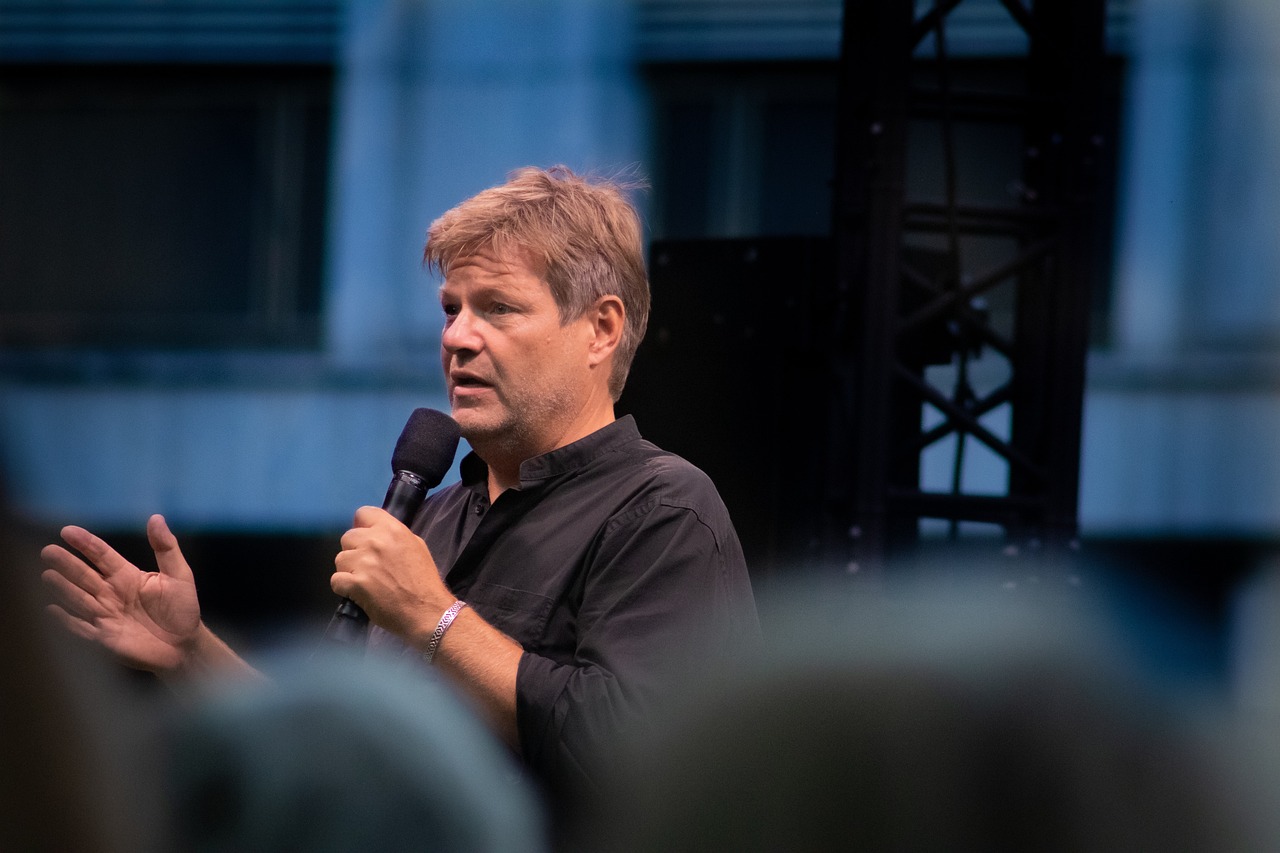
Impact on Policy-Making
Political idealism plays a crucial role in shaping policy-making processes across the globe. At its core, idealism promotes the notion that policies should be crafted with a vision for a better society, often prioritizing values such as justice, equality, and human rights. This approach can lead to ambitious reforms that aim to address systemic issues, but it also comes with its own set of challenges. For instance, idealistic policies often reflect the aspirations of a society, pushing for changes that resonate deeply with the public’s hopes and dreams. However, the gap between these aspirations and the practical realities of governance can sometimes create friction.
When political idealists influence policy-making, they tend to focus on long-term solutions rather than short-term fixes. This can be seen in various sectors, such as healthcare, education, and environmental policy. For example, in the realm of environmental policy, idealists advocate for sustainable practices that may not yield immediate economic benefits but promise a healthier planet for future generations. This visionary approach can inspire legislation that aims to combat climate change, promote renewable energy, and protect natural resources. However, the challenge lies in balancing these ideals with the economic and social realities that often impede progress.
Moreover, the impact of political idealism on policy-making can be both positive and negative. On one hand, it can lead to groundbreaking legislation that transforms society for the better. On the other hand, it can result in disillusionment when idealistic policies fail to deliver the promised outcomes. For instance, consider the ambitious healthcare reforms proposed by idealists that aim to provide universal coverage. While the vision is noble, the implementation can be fraught with complications, leading to public dissatisfaction and a loss of faith in the political system.
To illustrate the dual impact of political idealism on policy-making, let’s consider a few key areas:
| Policy Area | Idealistic Approach | Potential Challenges |
|---|---|---|
| Healthcare | Universal coverage for all citizens | Funding issues and political opposition |
| Environmental Policy | Commitment to reducing carbon emissions | Economic impact on industries reliant on fossil fuels |
| Education | Access to quality education for every child | Resource allocation and regional disparities |
In summary, the impact of political idealism on policy-making is profound and multifaceted. While it can inspire transformative changes that resonate with the public's aspirations, it also poses significant challenges that can lead to disillusionment. As idealists strive to implement their visions, they must remain cognizant of the practical realities of governance and the potential backlash from constituents who may feel let down by unmet expectations. The key lies in finding a balance between idealism and pragmatism, ensuring that policies not only reflect lofty goals but are also grounded in achievable outcomes.
- What is political idealism? Political idealism is a philosophy that emphasizes the importance of values and principles in shaping political policies and governance.
- How does political idealism influence policy-making? It encourages the creation of policies that aim for long-term societal benefits, often focusing on justice, equality, and sustainability.
- What are some challenges faced by political idealists? Idealists often encounter practical challenges, such as funding issues, political opposition, and the risk of disillusionment among supporters.
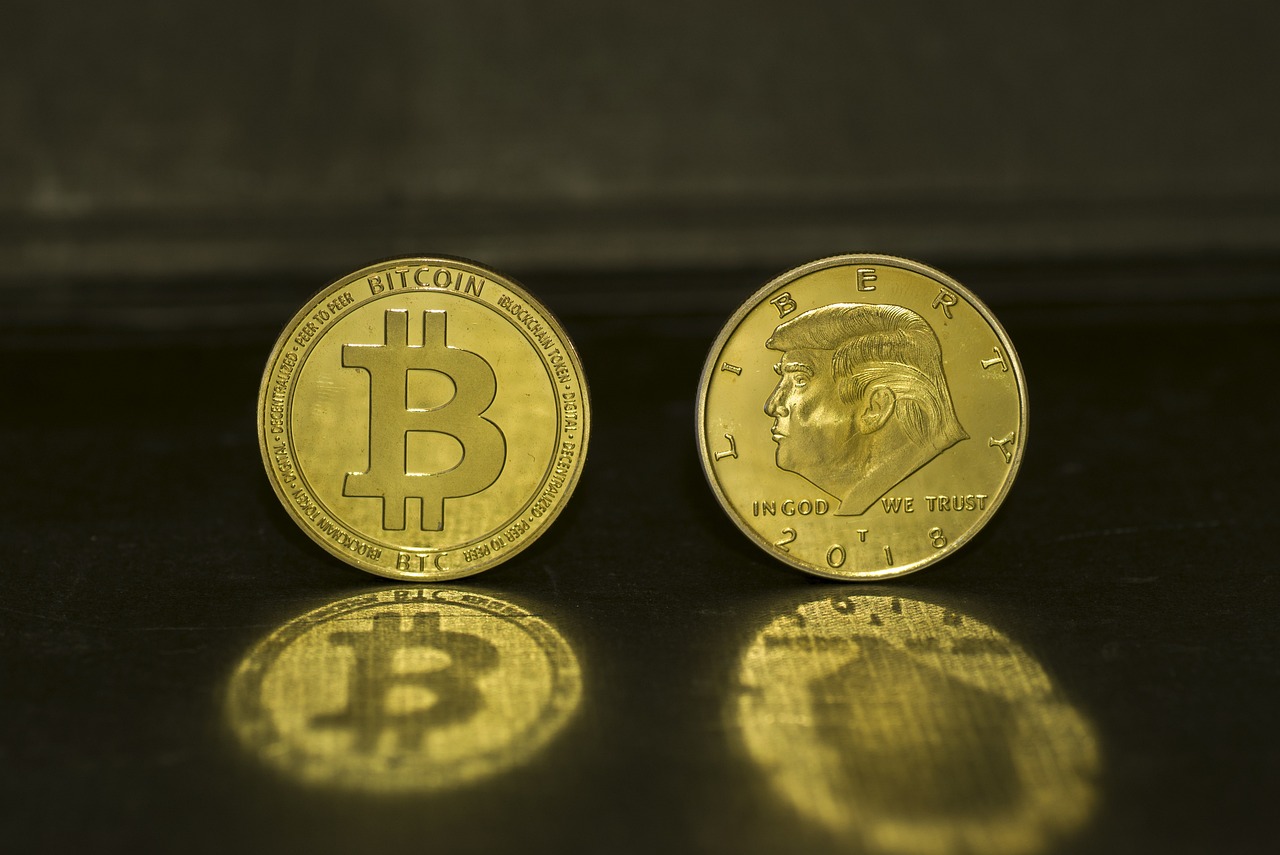
The Critique of Political Idealism
While political idealism can be a beacon of hope and a source of inspiration, it is not without its critics. Many argue that the lofty goals and aspirations of idealists can often lead to impracticality in real-world scenarios. This critique stems from the belief that idealism, while noble in intent, often overlooks the gritty realities of human behavior and societal structures. Critics contend that idealists may become so engrossed in their vision of a perfect world that they fail to acknowledge the complexities and imperfections inherent in political systems.
One of the most significant criticisms is the notion that political idealism can lead to disillusionment. When idealistic policies are implemented, they may not yield the anticipated results, leading supporters to feel betrayed or frustrated. This phenomenon can create a cycle of hope and disappointment, where the initial enthusiasm for reform is met with the harsh realities of political resistance and societal inertia. For instance, consider the ambitious policies aimed at addressing climate change. While the idealistic vision may call for sweeping reforms, the political and economic barriers often hinder progress, leaving advocates feeling defeated.
Moreover, the dichotomy between idealism and realism is a constant point of contention. Realists argue that political decisions should be grounded in the practicalities of the moment, focusing on what is achievable rather than what is desirable. This perspective emphasizes the importance of compromise and negotiation, which can sometimes clash with the unwavering conviction of idealists. The tension between these two schools of thought raises critical questions: Should we strive for perfection, or is it more pragmatic to accept incremental change? This debate is not merely academic; it has real implications for governance and policy-making.
Additionally, the consequences of idealistic policies can be a double-edged sword. While some initiatives may lead to transformative change, others can result in unintended negative outcomes. For example, policies aimed at promoting equality and social justice may inadvertently create divisions or foster resentment among different groups. The idealist's vision of a harmonious society can sometimes overlook the complexities of human relationships and the potential for conflict. This highlights the importance of a nuanced approach, one that balances idealism with a realistic understanding of societal dynamics.
In summary, while political idealism offers a compelling vision for a better world, it is essential to critically assess its limitations. The critiques surrounding idealism serve as a reminder that while we can aspire to lofty ideals, we must also remain grounded in the realities of human nature and the political landscape. Striking a balance between hope and pragmatism is crucial for effective governance and meaningful change.
- What is political idealism? Political idealism is a philosophy that emphasizes the pursuit of high ideals and principles in politics, often advocating for a vision of a better society.
- Why do critics oppose political idealism? Critics argue that political idealism can be impractical, leading to disillusionment and overlooking the complexities of human behavior and societal structures.
- How does political idealism differ from realism? Political idealism focuses on what ought to be, advocating for ambitious reforms, while realism emphasizes practical solutions based on current realities.
- Can idealistic policies lead to negative outcomes? Yes, while idealistic policies can inspire positive change, they may also result in unintended consequences, such as social divisions or resistance to change.

Idealism vs. Realism
When we dive into the world of political theory, we often find ourselves at a crossroads between idealism and realism. These two schools of thought are like two sides of the same coin, each offering unique insights into how we understand governance and societal values. While idealism paints a picture of a world driven by lofty principles and moral imperatives, realism takes a more pragmatic approach, focusing on the harsh realities of human nature and power dynamics. It's almost like comparing a dreamer to a realist; one sees the world as it could be, while the other sees it as it is.
At its core, idealism is about vision. It encourages leaders and citizens alike to aspire to a better world, to dream of policies that promote justice, equality, and the common good. Think of idealists as the architects of societal change, envisioning a future where everyone has a seat at the table. They advocate for ambitious reforms and policies that might seem unattainable, but they believe that striving for these ideals can lead to significant progress. For instance, movements for civil rights and environmental protections often stem from idealistic principles, pushing for systemic changes that reflect a more equitable society.
On the other hand, realism serves as a grounding force in political discourse. Realists argue that while ideals are important, they must be tempered with an understanding of human behavior and the complexities of international relations. They often emphasize the role of power, national interest, and security, suggesting that political actions should be guided by practical considerations rather than moral aspirations. Imagine a chess game where every move is calculated based on the current position on the board; that’s how realists approach politics. They focus on what is achievable in the here and now, often at the expense of idealistic goals.
To illustrate the differences between these two perspectives, consider the following table:
| Aspect | Idealism | Realism |
|---|---|---|
| Focus | Utopian visions and moral values | Pragmatic approaches and power dynamics |
| Policy Approach | Ambitious reforms | Incremental changes |
| View of Human Nature | Inherently good and capable of change | Self-interested and competitive |
| Examples | Civil rights movements, environmental activism | Realpolitik, national security strategies |
In practice, the tension between idealism and realism can lead to a fascinating interplay in political strategy. For example, during elections, candidates often oscillate between idealistic promises to inspire voters and realistic policies that acknowledge the limitations of what can be achieved. This dance can create a sense of disillusionment among constituents when the lofty promises of idealism clash with the often disappointing realities of political governance.
Ultimately, the debate between idealism and realism is not just an academic exercise; it has real-world implications. The challenge lies in finding a balance between the two, harnessing the visionary aspirations of idealism while remaining grounded in the practicalities of reality. As we navigate the complexities of modern governance, understanding this dynamic can help us foster a political landscape that is both aspirational and realistic, paving the way for meaningful change.
- What is political idealism? Political idealism is a philosophy that emphasizes the pursuit of moral and ethical ideals in political governance and policy-making.
- How does political realism differ from idealism? Political realism focuses on pragmatic and practical considerations, often prioritizing national interests and power dynamics over moral aspirations.
- Can idealism and realism coexist in politics? Yes, many political strategies incorporate elements of both idealism and realism, striving for ambitious goals while acknowledging practical limitations.
- What are some historical examples of political idealism? Notable examples include civil rights movements, environmental activism, and various social justice campaigns that aim for systemic change.
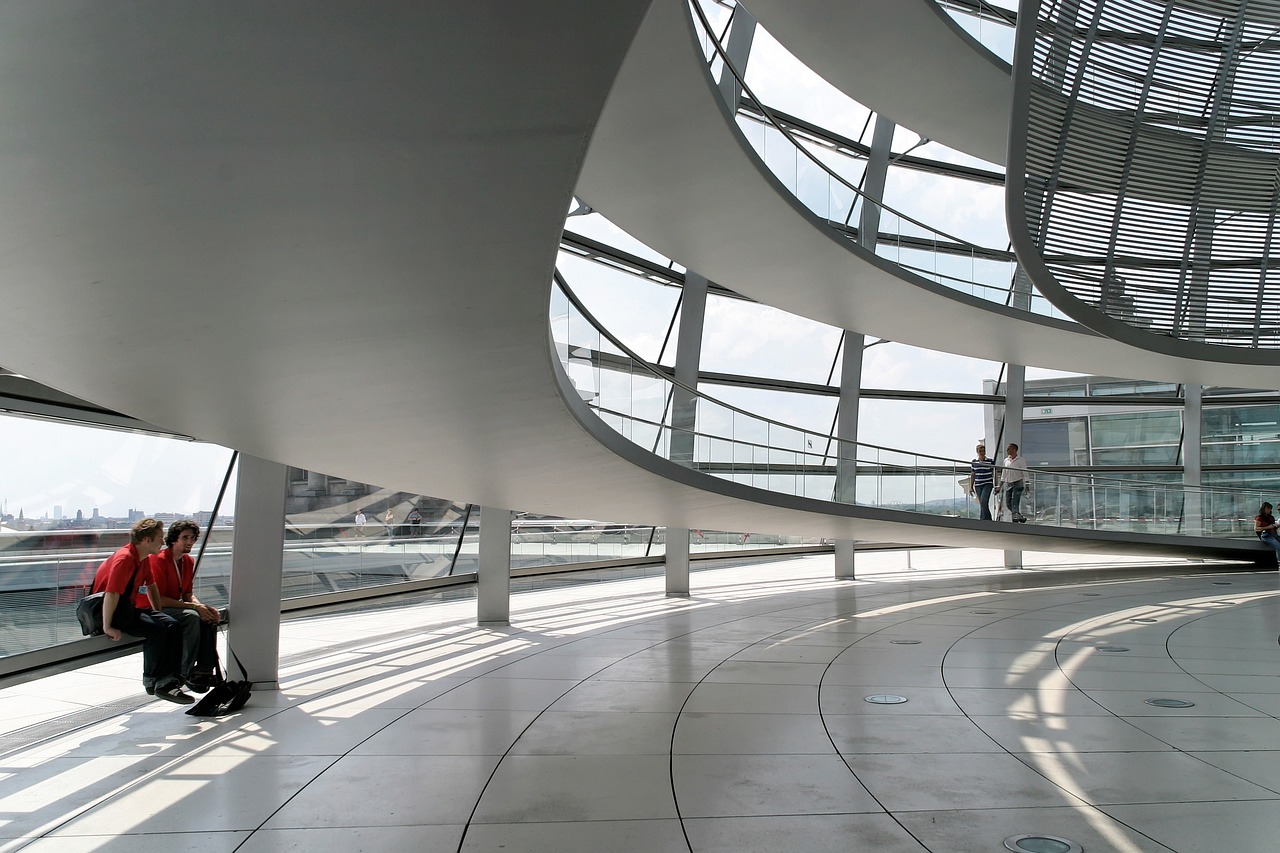
Consequences of Idealistic Policies
When we dive into the , we find ourselves in a complex landscape filled with both triumphs and tribulations. Idealism, with its lofty goals and grand visions, often aims to create a better world. But, like a double-edged sword, these policies can lead to outcomes that are not always beneficial. Imagine a beautiful painting that, upon closer inspection, reveals some brush strokes that just don’t quite fit. That's the essence of idealistic policies—they can be inspiring, yet sometimes they miss the mark.
One of the most significant consequences of idealistic policies is the potential for ambitious reforms that can lead to substantial social change. For instance, consider the impact of universal healthcare initiatives. Advocates of such policies often envision a society where every individual has access to medical care, regardless of their economic status. While the intention is noble, the implementation can be fraught with challenges. Budget constraints, political opposition, and logistical hurdles can turn a well-meaning ideal into a bureaucratic nightmare. This is where the clash between vision and reality becomes painfully evident.
Moreover, idealistic policies can sometimes lead to disillusionment among supporters. When the promised changes do not materialize or take longer than expected, the very individuals who championed these reforms may feel let down. This sentiment can breed a sense of skepticism towards future initiatives. For instance, the Green New Deal, aimed at addressing climate change and economic inequality, has faced criticism for its ambitious goals. While many support its vision, the practical steps to achieve these objectives are often met with resistance, leading to frustration among advocates.
In addition, the consequences of idealistic policies can vary greatly depending on the context in which they are applied. For example, in a society that is receptive to change, idealistic policies might flourish and lead to rapid advancements. However, in a more conservative or resistant environment, these same policies can provoke backlash, resulting in a regression rather than progress. This dichotomy highlights the importance of understanding the political and social landscape before implementing idealistic reforms.
To illustrate the mixed outcomes of idealistic policies, consider the following table that summarizes some well-known examples:
| Policy | Intended Outcome | Actual Consequence |
|---|---|---|
| Universal Healthcare | Access to medical care for all | Increased wait times, budget overruns |
| Green New Deal | Combat climate change and inequality | Political division, slow legislative progress |
| Education Reform | Equal access to quality education | Funding disparities, implementation challenges |
Ultimately, the consequences of idealistic policies remind us that while the pursuit of a better society is commendable, the road to achieving it is often fraught with obstacles. It's crucial for policymakers to strike a balance between their idealistic visions and the practical realities they face. By doing so, they can create a more sustainable approach to governance that not only dreams big but also delivers tangible results.
- What are the main criticisms of idealistic policies? Many critics argue that idealistic policies are often impractical and can lead to disillusionment when expected outcomes are not achieved.
- How do idealistic policies impact societal change? While they can drive significant reforms, the effectiveness of these policies often depends on the political and social context in which they are implemented.
- Can idealism coexist with realism in politics? Yes, many successful political strategies incorporate a blend of idealistic goals with realistic approaches to achieve sustainable outcomes.
Frequently Asked Questions
- What is political idealism?
Political idealism is a philosophy that emphasizes the importance of ideals and principles in shaping political thought and action. It advocates for a vision of society based on values such as justice, equality, and freedom, often pushing for reforms that align with these ideals.
- How has political idealism evolved over time?
Political idealism has evolved through various historical movements, influenced by key figures and events. From ancient philosophers like Plato to modern thinkers, idealism has adapted to reflect changing societal values and challenges, maintaining its relevance in contemporary political discourse.
- Who are some influential political idealists?
Notable political idealists include philosophers such as Plato, who envisioned the ideal state, and modern figures like Martin Luther King Jr., who championed civil rights through an idealistic lens. Their contributions highlight the diverse perspectives within political idealism and its impact on society.
- What impact does political idealism have on policy-making?
Political idealism significantly influences policy-making by inspiring ambitious reforms and legislation that aim to align with idealistic principles. This often leads to progressive changes in governance and societal norms, although it can also result in challenges when ideals clash with practical realities.
- What are the main critiques of political idealism?
Critics argue that political idealism can be impractical, as it often overlooks the complexities of real-world politics. Additionally, there's a concern that idealistic policies may lead to disillusionment among supporters when outcomes do not meet lofty expectations.
- How does political idealism differ from realism?
Political idealism focuses on what ought to be, emphasizing moral values and aspirations, while realism is rooted in pragmatic considerations and the harsh realities of political life. This contrast can lead to tensions in political strategy and decision-making, as idealists and realists often have differing priorities.
- What are the consequences of idealistic policies?
Idealistic policies can lead to both successful outcomes and notable failures. While some reforms may achieve their intended goals, others might face backlash or unintended consequences, illustrating the challenges idealists encounter when trying to implement their visions in practice.



